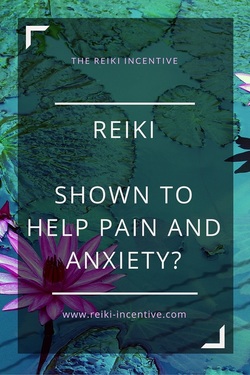
Hello again and welcome back. I was asked recently about what research studies have been conducted into the benefits of Reiki, and what the results were. Surprisingly, quite a lot of studies have been carried out. Although many of them are small scale studies they are still useful and of course it is still early days in the world of Reiki research. Interestingly repeated studies which have looked at Reiki in relation to pain and anxiety seem to indicate that these are areas where Reiki might well be showing a measurable positive effect. In 2014, a systematic review was published which sought to examine all the trials of Reiki for the relief of pain and anxiety which were published in the year 2000 or later. Although the number of trials found were limited (at least in comparison to trials of conventional treatments), the authors concluded that there is evidence to suggest that Reiki may be effective for reducing pain and symptoms of anxiety.¹ They therefore suggested that further research in the form of larger trials be conducted. These positive results are also supported by an earlier trial which was conducted in 1998 and therefore not included in the review.² A systematic review is a particular piece of research which is conducted using a specific set of rules. Its aim is to systematically seek out all the clinical trials which address a particular question. It then examines each study, assessing the way in which it was conducted, and considers the results of all the trials in order to come to a conclusion about whether a treatment or therapy is effective for that particular condition. In mainstream medicine, a systematic review is considered to be the most persuasive form of evidence. So a positive systematic review which indicates the potential of Reiki is quite a coup. This is a confidence boost. I know quite a few practitioners, particularly newer ones, often feel quite unsure about how Reiki will be perceived by others, or who question how effective they can be. I don’t think this means that as Reiki practitioners we should rush out and start making new claims about Reiki (just yet). As we know, Reiki is holistic and individual. As practitioners we don’t seek to treat individual conditions or symptoms, rather we seek to treat the whole person. We’re not health professionals trained to treat specific conditions (unless of course we’ve qualified to be), but we can claim to offer a supportive complementary holistic approach which can help people to heal in a wider sense and to cope more effectively with whatever they are facing. How great to know that there is also early but indicative research which shows that it also helps with any associated pain and anxiety. There will be more in my next posts, where I'll take a look at Reiki for depression and also Reiki in cancer care. Are you interested in learning more about research into Reiki? Why not sign up for updates using the box below. I'll let you know when I post anything new and your email address will be quite safe.
References:
1. Thrane, S. & Cohen, S.M. (2014), Effect of Reiki Therapy on Pain and Anxiety in Adults: An In-Depth Literature review of randomized Trials with Effect Size Calculations. Pain Management Nursing, 15(4) pp 897 – 908. 2. Dressin,L. J. & Singg, S. (1998), Effects of Reiki on pain and selected affective and personality variables of chronically ill patients. Subtle Energies and Energy Medicine, 9 (1):53-82.
2 Comments
|
Author
Angela established the Reiki Incentive for Reiki practitioners who want to see Reiki more widely accepted and to see it reach new people. She enjoys sharing her passion for authentic practice as well as research into the benefits of this wonderful therapy. Archives
May 2018
Categories
All
|

 RSS Feed
RSS Feed
